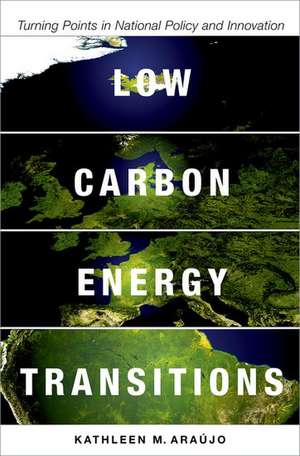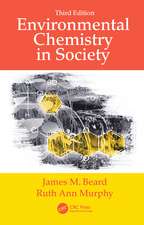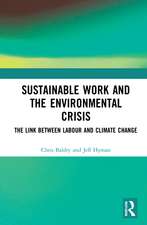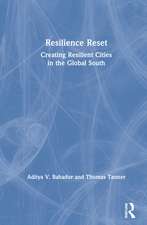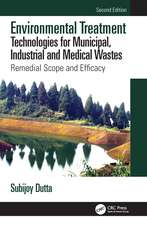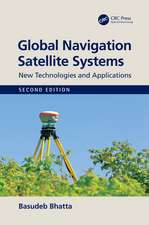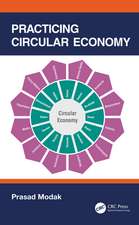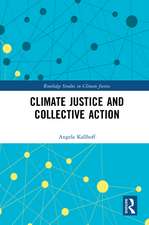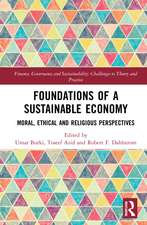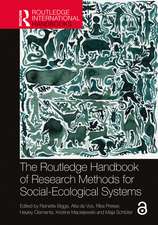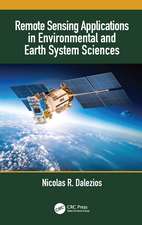Low Carbon Energy Transitions: Turning Points in National Policy and Innovation
Autor Kathleen Araújoen Limba Engleză Hardback – feb 2018
Preț: 334.92 lei
Nou
Puncte Express: 502
Preț estimativ în valută:
64.09€ • 66.91$ • 53.04£
64.09€ • 66.91$ • 53.04£
Carte disponibilă
Livrare economică 04-10 martie
Preluare comenzi: 021 569.72.76
Specificații
ISBN-13: 9780199362554
ISBN-10: 0199362556
Pagini: 398
Ilustrații: 90
Dimensiuni: 157 x 236 x 33 mm
Greutate: 0.82 kg
Editura: Oxford University Press
Colecția OUP USA
Locul publicării:New York, United States
ISBN-10: 0199362556
Pagini: 398
Ilustrații: 90
Dimensiuni: 157 x 236 x 33 mm
Greutate: 0.82 kg
Editura: Oxford University Press
Colecția OUP USA
Locul publicării:New York, United States
Recenzii
We are heading to a low carbon economy, both nationally and globally, and at an accelerated pace. Innovation and informed decision-making will be needed in technology, policy and regulation, and business models, all aligned for deep decarbonization on a generational time scale. Dr. Araújo's integrative approach will provide important insights for those shaping the low carbon future.
The remarkable growth in clean energy investment over the last decade has been driven by policy and technology. The unique cases addressed by Dr. Araújo provide critical lessons as the world transitions to low carbon energy.
This well-researched and clearly written book begins with a rationale for transitioning to low carbon energy and a theoretical discussion of factors that can enable and constrain such a change.... This book will be of use and interest to researchers, students, and practitioners focusing on energy systems and sustainability.
In a world with fear for climate change, this book offers some ground for optimism. It presents insights into how national energy systems have been radically transformed. This book will be of interest not only for students and decision-makers. It shows that all citizens have a role to play in the transition process and, perhaps most importantly, that change is possible.
An essential reading for all interested in transformative energy change. This book presents comprehensive, case studies of radical change in energy systems, within a broader context of the history and theory of energy-systems evolution. It provides valuable insights into how radical change can be achieved.
It is increasingly clear that our pursuit of sustainable development and climate change goals is driving a great energy transition. Dr. Araújos compelling narrative deftly weaves together history, theory, and practice, providing an optimistic guide for all those who want to take well-informed action now on low carbon change, and to do so with confidence.
The key challenge in energy policy has become to transform national energy systems towards a low carbon paradigm. For this, scholarly debates are in need of comparative studies informed by primary data, subscribing to principles of rigorous academic inquiry. This book perfectly delivers on these fronts.
This book provides a fascinating and detailed account of the energy transition experience of four countries. By looking at the technical and social, economic and political factors involved, it teaches us about the complexity of any major change. A valuable lesson in these times of major shifts and redesigns in technology, energy, lifestyles and institutions.
The remarkable growth in clean energy investment over the last decade has been driven by policy and technology. The unique cases addressed by Dr. Araújo provide critical lessons as the world transitions to low carbon energy.
This well-researched and clearly written book begins with a rationale for transitioning to low carbon energy and a theoretical discussion of factors that can enable and constrain such a change.... This book will be of use and interest to researchers, students, and practitioners focusing on energy systems and sustainability.
In a world with fear for climate change, this book offers some ground for optimism. It presents insights into how national energy systems have been radically transformed. This book will be of interest not only for students and decision-makers. It shows that all citizens have a role to play in the transition process and, perhaps most importantly, that change is possible.
An essential reading for all interested in transformative energy change. This book presents comprehensive, case studies of radical change in energy systems, within a broader context of the history and theory of energy-systems evolution. It provides valuable insights into how radical change can be achieved.
It is increasingly clear that our pursuit of sustainable development and climate change goals is driving a great energy transition. Dr. Araújos compelling narrative deftly weaves together history, theory, and practice, providing an optimistic guide for all those who want to take well-informed action now on low carbon change, and to do so with confidence.
The key challenge in energy policy has become to transform national energy systems towards a low carbon paradigm. For this, scholarly debates are in need of comparative studies informed by primary data, subscribing to principles of rigorous academic inquiry. This book perfectly delivers on these fronts.
This book provides a fascinating and detailed account of the energy transition experience of four countries. By looking at the technical and social, economic and political factors involved, it teaches us about the complexity of any major change. A valuable lesson in these times of major shifts and redesigns in technology, energy, lifestyles and institutions.
Notă biografică
Dr. Kathleen M. Araújo is an Associate Professor at Boise State University in the School of Public Service, Director of the Energy Policy Institute with the Center for Advanced Energy Studies, and Books Series Editor for Routledges Studies in Energy Transitions.Dr. Araújo specializes in strategic decision-making and planning associated with energy-environmental systems change. She teaches and consults on better practices associated with innovation, resilience, industrial development, and security. She earned her PhD at MIT, and completed post-doctoral research at Harvard.
